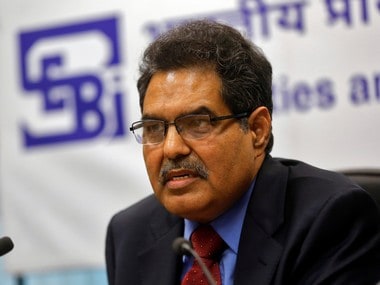Raising concern over its autonomy, the Securities and Exchange Board of India (SEBI) Chairman Ajay Tyagi reportedly wrote a letter to the Prime Minister’s Office (PMO) and the finance ministry seeking to have a relook at the Budget 2019 proposal to transfer its surplus funds to the Consolidated Fund of India, said a media report. The SEBI chief has written to the PMO and finance ministry a week after the employees association of the market regulator had shot a letter to the Centre opposing the Budget proposal that seeks to transfer 75 percent of the regulator’s surplus funds to government coffers. The proposal would result in compromising SEBI’s
autonomy
and its ability to function effectively towards its stated objectives, and thus, hamper the progress of Indian securities markets, said a report in Moneycontrol citing the SEBI chairman’s letter. [caption id=“attachment_4279205” align=“alignleft” width=“380”] File image of SEBI chairman Ajay Tyagi. Reuters.[/caption] “The regulator’s autonomy is an important parameter foreign investors take into account before deciding to invest,” the report said quoting a senior SEBI official. In the Finance Bill presented by Finance Minister Nirmala Sitharaman on 5 July, it was proposed that the SEBI board would “constitute a reserve fund and 25 percent of the annual surplus of the general fund should be credited to the reserve fund.” Such funds should not exceed the total of the annual expenditure of the preceding two financial years, the Budget proposal said. “After incurring all the expenses, the surplus of the general fund shall be transferred to the Consolidated Fund of India,” the Budget proposal said. Last week, a SEBI employees’ body had reportedly sent a letter to Sitharaman
opposing
the Budget proposal that seeks to transfer 75 percent of the regulator’s surplus funds to the Consolidated Fund of India, said a report in The Hindu Business Line. Terming the proposal as an additional tax burden on market participants, the report, citing the letter, called the move that necessitated the market regulator seeking government nod for its annual expenditure regressive. The letter by SEBI employees’ body had said the market regulator didn’t have the
mandate
to raise revenue for the government, said a report in The Economic Times. “The fee received is reasonably sufficient to cater to the running expenses of Sebi, so that Sebi does not need to seek funding from the government,” the report said quoting the SEBI Employees Association.
File image of SEBI chairman Ajay Tyagi. Reuters.[/caption] “The regulator’s autonomy is an important parameter foreign investors take into account before deciding to invest,” the report said quoting a senior SEBI official. In the Finance Bill presented by Finance Minister Nirmala Sitharaman on 5 July, it was proposed that the SEBI board would “constitute a reserve fund and 25 percent of the annual surplus of the general fund should be credited to the reserve fund.” Such funds should not exceed the total of the annual expenditure of the preceding two financial years, the Budget proposal said. “After incurring all the expenses, the surplus of the general fund shall be transferred to the Consolidated Fund of India,” the Budget proposal said. Last week, a SEBI employees’ body had reportedly sent a letter to Sitharaman
opposing
the Budget proposal that seeks to transfer 75 percent of the regulator’s surplus funds to the Consolidated Fund of India, said a report in The Hindu Business Line. Terming the proposal as an additional tax burden on market participants, the report, citing the letter, called the move that necessitated the market regulator seeking government nod for its annual expenditure regressive. The letter by SEBI employees’ body had said the market regulator didn’t have the
mandate
to raise revenue for the government, said a report in The Economic Times. “The fee received is reasonably sufficient to cater to the running expenses of Sebi, so that Sebi does not need to seek funding from the government,” the report said quoting the SEBI Employees Association.
SEBI chief Ajay Tyagi writes to PMO, finance ministry seeking to reconsider Budget proposal on surplus fund transfer
FP Staff
• July 17, 2019, 19:11:36 IST
Last week, a SEBI employees’ body had reportedly sent a letter to Sitharaman opposing the Budget proposal that seeks to transfer 75% of the regulator’s surplus funds to the Consolidated Fund of India.
Advertisement
)
End of Article